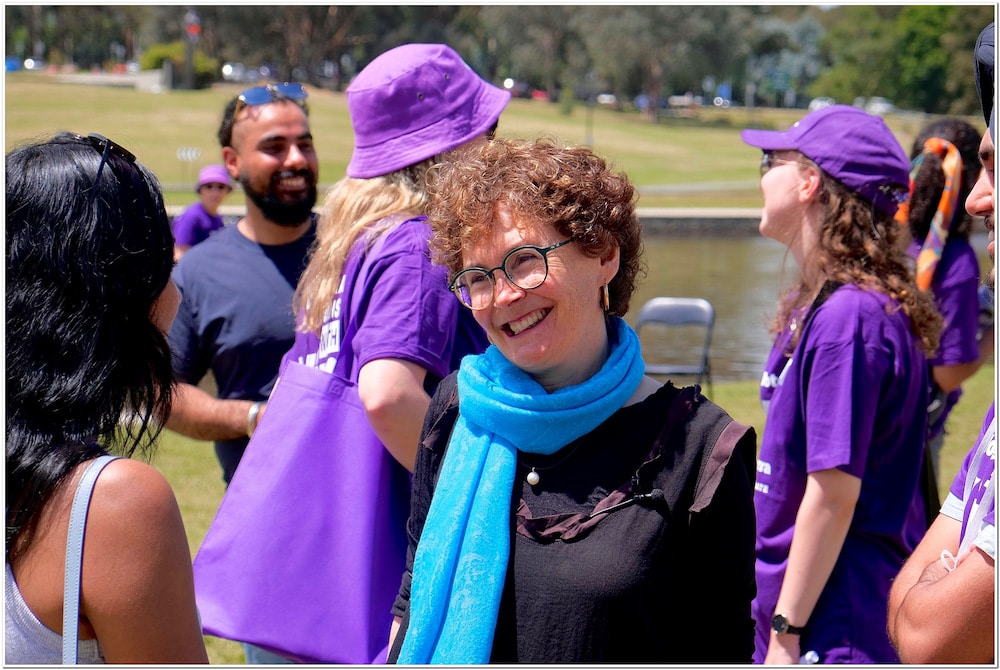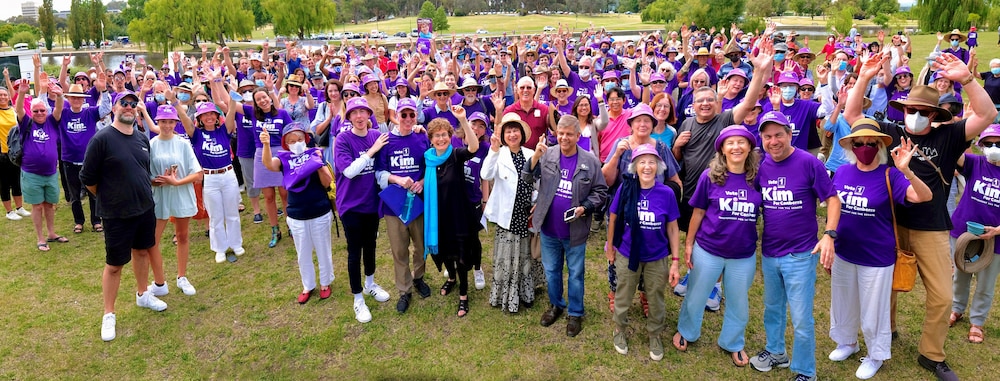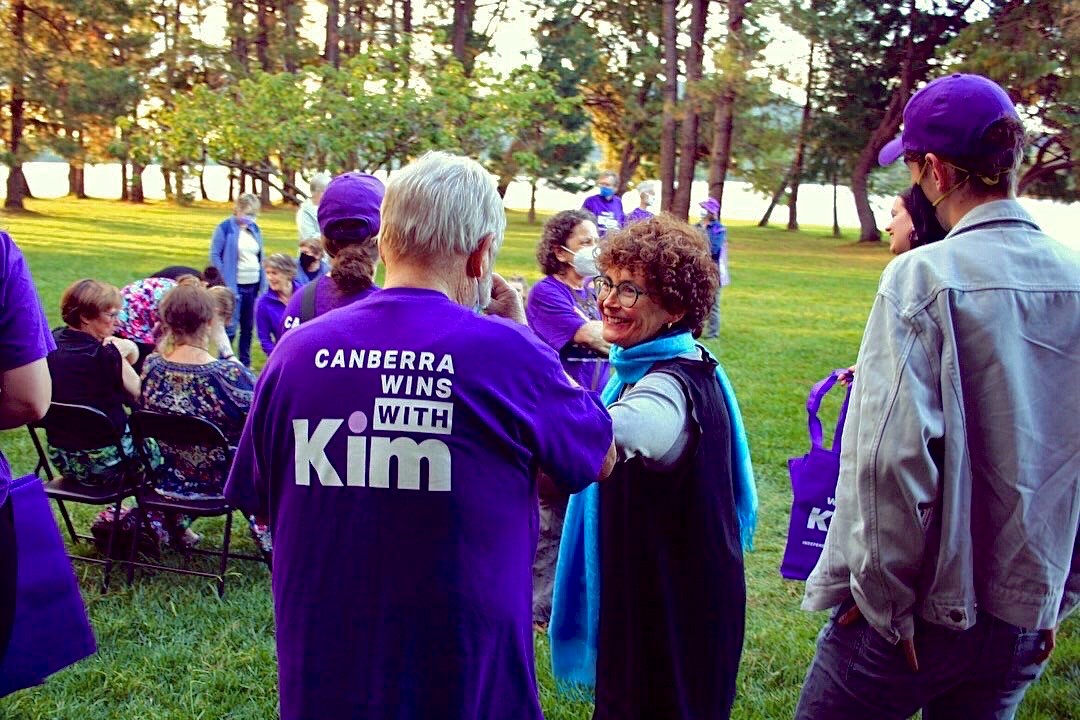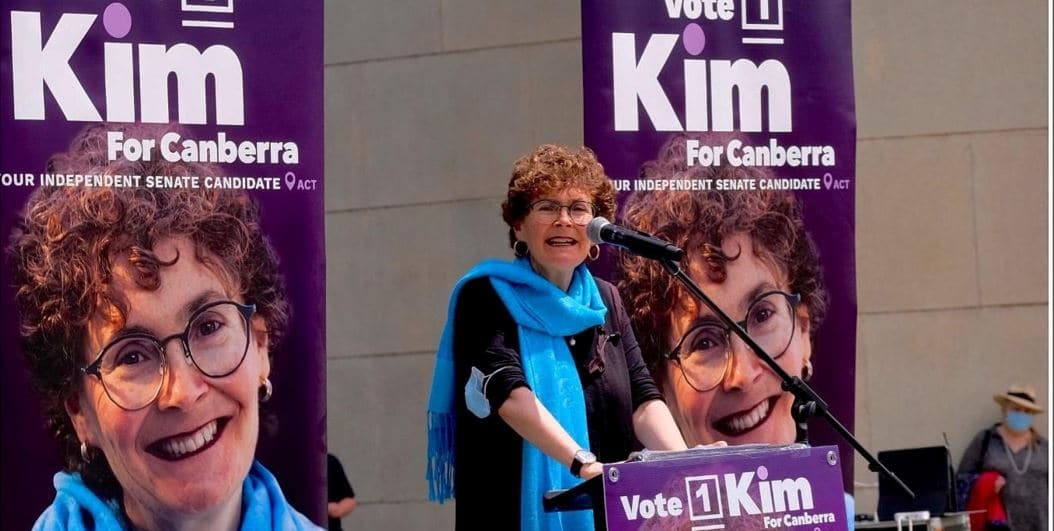Kim Rubenstein wanted to “paint the town purple”, and, although her bid to become the ACT’s first independent senator was unsuccessful, the constitutional and citizenship law expert says she is content with the result.
“I feel proud that I was the first person to put up my hand and create a party in order to run as an independent for the ACT. I got the ball rolling.”
It was also, she said, a lot of fun: from purple-clad Kim for Canberra volunteers dancing near intersections in peak hour, to supporters dressing up as “Kim” in purple wigs and scarves as she cast her ballot.
“It’s serious, but you’ve got to enjoy what you’re doing!”
Following the lead of MPs Helen Haines and Zali Steggall, Professor Rubenstein ran on a platform of urgent climate action, restoring integrity to politics, women’s safety, and Territory rights and standing up for Canberra.
“There was a palpable dissatisfaction with the way our parties were operating: their inability to look beyond the next election and talk about the national interest or community interest; the inability for more positive forces within the parties to have any traction.”
Despite an enthusiastic ‘community’ of supporters, she received 4.4 per cent of the primary vote, according to votes counted so far.
“It’s not the result we were after, and that is obviously disappointing; it would have been great to take that into Parliament.” But, she reflected:
“I feel like I’ve achieved one of the most significant things I wanted to do: run a campaign that stayed true to my values, my commitments, and my policies. That was a driving force for me, showing you could do politics differently. It could be about the ideas and the integrity of the race as much as the integrity of the issues that I was pushing.”
- Kim for Canberra launches campaign (February 2022)
- Kim Rubenstein’s party is above the line (January 2022)
- Kim for Canberra: Independent’s Senate bid (August 2021)
When the election was called, Professor Rubenstein signed an election pledge to run a fair and honest campaign, criticising policies rather than attacking people, and invited other candidates to do the same.
“I never ran anything negative about anyone else; it was about staying true to what I was bringing, and why voters should vote for me, because of the value of having me in parliament, not about who they were going to get out.”

She hopes some of her policies will be taken up by elected politicians. Labor’s Treasurer Jim Chalmers, for instance, has said he will consider an “Accord-like” deal on climate and energy policy, similar to her proposed climate compact, based on the 1983 Prices and Income Accord.
“I’m really hopeful they will move forward with that,” Professor Rubenstein said. “It will be a wonderful flow-on from my policies if that happens.”
Similarly, she expects that David Pocock (if elected) will double the number of ACT senators from two to four, as she proposed. That would lower the quota from 33 to 20 per cent, and ensure the ACT would always have an independent senator or one from a smaller party, she argues.
“Having an independent here for us in the ACT is huge, if that happens.”
- Kim Rubenstein: Labor agrees with her climate accord (May 2022)
- Kim Rubenstein calls for a climate compact for Australia (April 2022)
- Kim Rubenstein pushing for two more ACT senate seats (April 2022)
Professor Rubenstein is not surprised by the move towards independents; she considers it “a real reminder that there is a point beyond which your citizenry will say: ‘That’s not good enough’, and consider their options”.
“That should energise a lot of people like me who may have always had politics as an ideal in their head, but the party-political system has never attracted them. It provides an avenue for different voices.”
What happens next
Professor Rubenstein, who has been on unpaid leave, will return to the University of Canberra, where she is a professor in the Faculty of Business, Government and Law, and (academic) co-director of the 50/50 by 2030 Foundation, a research and advocacy centre for equal representation of women in government and public institution leadership. She will continue to be an honorary professor at the Australian National University, supervising Ph.D. students; and will interview “trailblazing women” in law for her National Library oral history project.
Her running mate, Kim Huynh, will resume his work as an ABC radio presenter and fellow ANU academic.
- Kim Rubenstein announces running mate (April 2022)
Professor Rubenstein said her Jewish identity has been a strong part of her contribution to Australia. As a student, she became involved with the youth movement, “which was all about social justice and improving the lot of the community. A sense, also, that you’re blessed with certain skills – they’re not just for your own benefit, they’re to be used for improving society.”
“Even without winning, I used my skills to the best of my ability in this election, and influenced significantly people to become active citizens. That’s very affirming.”
Many of Professor Rubenstein’s supporters had never joined a political party or been involved in a campaign before, but were motivated by what she wanted to achieve, she said.
“I don’t think I expected to meet so many people I’d never met before … from different sectors of the ACT or Canberra,” Professor Rubenstein said. “We’ve created a new community. That’s a lovely act of citizenship.”
She hopes to keep that community connected, perhaps through regular newsletters, or meetings two or three times a year.
“Everything I’ve done up until now is about active citizenship, and I’ll continue to do that.”

Improving active citizenship
But Professor Rubenstein is concerned that too many Australians only think about politics every three years.
“It is the everyday,” she said. “It is about the quality of your life and the decisions that are made on your behalf, and have an impact on our everyday, whether it be the cost of living, our access to citizenship, to housing, our ability to travel freely around the world, to believe in the accountability and transparency of what happened.”
At her booth on election day, she was struck by the number of people who turned up with very little thinking in advance of what they were doing.
“It would be nice to somehow connect with those individuals, because the outcome of an election has just as much, if not more, of an impact on their lives than it does on those who put a lot of thought into it. For them to be better represented requires them to have some better sense of what they’re choosing between. How do you activate those individuals in a way that speaks to their lives?”
Civics and citizenship education is key, she believes; before they turn 18, students should learn to vote in as informed a way as possible, and not just based on the whim of the moment.
Again, election spending should be reviewed; she argues there should be a cap on expenditure, not merely on donations.
“If an individual can find $100 million to spend, is that healthy? Is that something we should tolerate? Because it leads to inequitable outcomes. I hope a Labor government with Independents and Greens will address this.”
She was also dismayed by anti-Semitic slurs pasted on her corflutes.
“That was disappointing, and a bit sobering. But the general response from the other candidates and most Canberrans was how disgraced they were about it, and how unacceptable that was.”
Jew-hatred is unfortunately high around Australia, according to the Executive Council of Australian Jewry, Professor Rubenstein states, and neo-Nazi groups exist even here. She believes more community education about anti-Semitism and racism in general is necessary, along the lines of the B’nai B’rith’s Courage to Care program.
“If we see things crop up, we should do something about it. We shouldn’t just be bystanders.”

Professor Rubenstein thanked everyone who participated in her campaign. “As citizens, we all have a role to play in voting. For this election, we really did see the Canberra community recognise that there were different options.”
She particularly thanked the people who joined her and helped her, and invited the public to contact her – either through the Kim for Canberra entity or in her role as academic, active citizen, public intellectual – to be involved in active citizenship.
“Even though we won’t have another election for three years, I hope there’s enough energy from people’s involvement with the Kim for Canberra campaign to stay energised and connected.”



